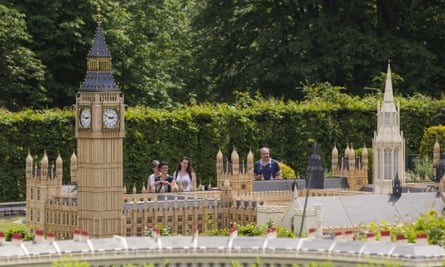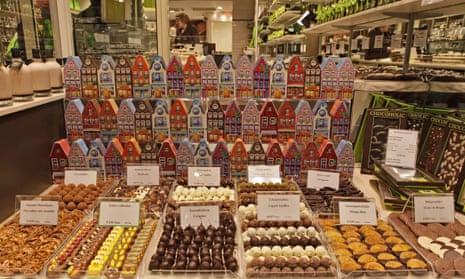The film was to begin with a shot of the Houses of Parliament. Patriotic music on the soundtrack (“Land of Hope and Glory”, probably). A blustering British journalist in his mid-60s – think Boris Johnson if he had never become an MP – speaking to camera. “London,” he intones. “For centuries, the place where the British ruling class has made its decisions. The parliament building is the seat of government for the whole of the United Kingdom. A place steeped in tradition, symbolising all that is best about Britain: proud, independent, committed to the freedom of the British people.”
At which point a voice off camera calls out “Cut!”. And then “the music stops abruptly and the camera pulls back to reveal what appears to be a man 300ft tall, standing behind the parliament building. This is James, a British journalist with grey hair, a cynical expression and an impeccable, tailor-made suit from Savile Row. We now realise that we are merely looking at a scale model of the parliament building. It comes up to James’s waist, and is surrounded by models of other European landmarks: the Eiffel Tower, the Brandenburg Gate, the leaning tower of Pisa etc. We are in Mini-Europe, the theme park just outside Brussels, and James is being interviewed by a French TV crew.”
These are the directions for what was to have been the opening scene of a film called The Chocolate War, devised and created by the French director Julie Gavras. In the spring of 2011 she contacted me and asked if I would co‑write the screenplay with her. We worked together on it over the next three years, and looking back, the project now inspires me with a wistful sense of missed opportunity. The theme of the film was to have been the European Union – how it works, how it fails to work and how the French and British view it quite differently – and if we had made it in time for the referendum, held a year ago this week, its release might have been extremely timely.
Julie had studied international law before becoming a film-maker, and the cerebral starting point of her story was a fascination with how European law is made. It was a process she found admirable as well as absurd, and this was the balance she wanted to catch in her screenplay. She chose as her subject the EU “chocolate war” of the 1990s, which originated in a dispute over differing European perceptions of what does or doesn’t constitute chocolate. Ever since the second world war, when cocoa butter was in short supply, the British in particular had been eking out their chocolate with extra milk and vegetable fats. However, when we joined the Common Market in 1973, the other Europeans were having none of that, insisting that real chocolate, in order to be worthy of the name, must contain 100% cocoa butter, and this argument rumbled on for 30 years. The British, Irish and Danes lined up on one side, with the chocolate purists – led by France, Belgium, Spain and Italy – ranged against them on the other.

It was clever of Julie to choose this issue as the basis for the screenplay: she understood that, for many people, chocolate is a highly emotive subject, closely bound up with childhood memories and the emotional nourishment of comfort eating. An insult to your country’s chocolate is both a personal insult and an attack on your sense of national identity. Julie didn’t know it when she approached me, but this was especially true in my case, as many members of my family had worked at the Cadbury factory in Bournville; I had grown up with a passionate, almost genetic attachment to the taste of Cadbury Dairy Milk.
Against the background of this dispute, played out in committees, council meetings, lobbyist meetings, voting sessions in Brussels and Strasbourg, the film was to have a romcom element. Our heroine, Albertine, a sophisticated (not to say snobby) French publisher who reluctantly takes on the task of lobbying for the chocolate purists, was to embark on an affair with Martin, the lobbyist for a large, Birmingham-based company that produced what Julie insisted on describing as “greasy British chocolate”.
Working on the script was, for the most part, a pleasure and an education, not only when Julie and I were thrashing out treatments and devising scenes but also when we were doing the research. I had come to the project knowing little about the European parliament and how it works. Britain had joined the Common Market when I was only 11 years old, and since then I’d taken our participation for granted, not really thinking about it, treating it as a kind of background noise to a daily life in which I didn’t directly feel many tangible benefits from EU membership, but couldn’t see any drawbacks either.
Researching the script changed that. It involved spending a lot of time in Brussels and Strasbourg, talking to MEPs, sitting in on meetings and voting sessions. As a result I ended up somewhat in awe of the EU’s incredibly ambitious, complex and meticulous lawmaking process. Of course, that process could be time-consuming – 30 years to decide on a definition of chocolate! – but it seemed fair, transparent and, most important of all, profoundly democratic. I started to relish my visits to the parliament building in Brussels, which began to feel now like a vast, modern, open monument to democracy and international co-operation.
A scene towards the end of the script took place on a beach near Ostend. Martin, our hero, has become an MEP by now and chooses to make his maiden speech at the first world war cemetery where his great-grandfather is buried. The speech we wrote was not exactly subtle but we both felt it was important to include it: “Look at all these gravestones,” he says, “and ask yourself what they tell us about the long journey we Europeans have made in the last 60 years. In 1914, when the European countries disagreed with each other, what did we see? Bloodshed and carnage. Millions of young men killed … But it’s not like that any more. Now – slowly – we are learning how to trust each other, even our former enemies. Sometimes the system doesn’t work but when you think about it, we are making progress. Real progress.”
An obvious sentiment, for sure, but it amazed me, as the feeble remain campaign unfolded here last year, that nobody was expressing it. The debate was couched in such predictable economic terms and hardly anybody was speaking up for the EU as an idea – one that had made a huge contribution to peace and stability since the 1950s.
Before starting work on The Chocolate War, Julie had shot a film in London – an English-language comedy called Late Bloomers, with the intriguing cast of Isabella Rossellini, William Hurt, Simon Callow, Joanna Lumley and Leslie Phillips. The experience seemed to have left her with a lasting fascination with the English, the difficulty of understanding them, their deceptive use of irony and their skill at using linguistic codes to befuddle outsiders. “Why this phrase, ‘I’m afraid’?” she would ask me. “Why say, ‘I’m afraid that I disagree with you’? What are they afraid about? A French person would never say, ‘J’ai peur … ’ in that situation. It sounds ridiculous.” Her conclusion seemed to be that there was an element in the English character that was essentially disingenuous, saying one thing and meaning another, professing sympathy and co-operation while maintaining a position that was fundamentally antagonistic. Gradually, as the script evolved, we both came to see this as being characteristic of the UK’s position towards the EU over the last few decades.
By the end of 2014, we had a third-draft script that we both liked, but attempts to raise money for the film ran aground. It seemed that financiers found it difficult to share our vision of a film that could set romantic comedy against a background of European politics and trade negotiations. Besides, we were still having trouble coming up with a convincing ending. In London, David Cameron was dangling the prospect of a referendum on EU membership to appease Ukip and the right wing of his party. Could it happen? And if it did, could the UK really decide to pull out? I told Julie that, in my opinion, such a decision would fly in the face of all reason. But so strong (even now) was Britain’s wounded sense of post-imperial pride, and so relentless was the drip-drip of anti-EU stories that flowed from our newspapers, it was a distinct possibility that we would vote that way by the narrowest of margins. Perhaps the script’s final scene, back in Mini-Europe, in which the Eurosceptic journalist James mutters that the now Europhile Martin has been “ruined by Europe”, and ends by giving the model Eiffel Tower a petulant kick, was not so far out after all.
A few weeks ago I emailed Julie to ask if it was OK to write this article, and in her reply she admitted that she could not let the script go and was finishing a new draft which she wanted to send to me. So perhaps there is life in the project yet. I really hope so, because Brexit – especially in the light of the election and its fallout – is very much unfinished business. It will continue to divide the nation for years to come, and to me The Chocolate War feels, if anything, more pertinent than ever. Even as British politics becomes more and more absurd and self-satirising, I still firmly believe in the power of comedy to tell the truth, and can see that Julie’s idea of using chocolate as a metaphor for national identity was a stroke of genius. You can write pages of analysis on the absurdity of national pride and imperial nostalgia in the 21st century, but I like to think we caught its essence in one line: when a British MEP, scrambling around on the floor in the midst of a chocolate tasting session that has descended into slapstick and chaos, looks up at his French opponent and wails in outrage “He trod on my Curly-Wurly!”. I hope that moment remains in the new draft, if nothing else.

Comments (…)
Sign in or create your Guardian account to join the discussion